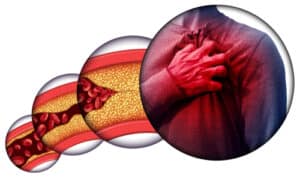
Lifestyle Changes for Atherosclerosis
One of the very best things a person can do to manage their atherosclerosis is to take a good, hard look at their lifestyle habits. Multiple studies have shown that lifestyle modifications can slow or even reverse some of the plaque formation that has occurred. Suggestions include:
- Eat a heart-healthy diet. The risk factors associated with atherosclerosis can be brought under control by eating for a healthy heart and regulated blood sugar. A heart-healthy diet generally includes whole grains and soluble fiber, fresh fruits, and vegetables. It is low in sodium, trans fats and saturated fats, and refined carbohydrates.
- Make movement a priority. A sedentary lifestyle is a major risk factor for atherosclerosis, diabetes, high blood pressure, and other potentially serious conditions. Daily exercise, even if only a 30 to 45 minute walk, helps the body receive and utilize oxygen more efficiently. Ideally, exercise will increase breathing and heart rate for at least 30 minutes at one time.
- Avoid smoking and tobacco use. The chemicals in cigarettes and tobacco products have been shown to damage the arteries and inhibit oxygen use.
- Learn to manage stress. The average American lifestyle is relatively stressful. We are a productive bunch, and most people have a difficult time slowing down and caring for health and wellness, especially when it involves sleep and rest. To manage heart health, though, it is essential to manage stress well. Techniques like yoga, meditation, walking in nature, and deep breathing can help.
Lifestyle changes are often the first recommendation given to patients diagnosed with atherosclerosis. A doctor may also prescribe medication to slow or reverse this condition. If lifestyle and medications do not improve cholesterol and arterial health, surgery such as angioplasty or endocardectomy may be necessary. Minor surgical procedures work by removing the blockages that have developed.
Suffolk Vascular & Vein Center provides treatment for the full spectrum of arterial disease. Contact us to schedule an appointment at our Hauppauge, Port Jefferson Station, or Riverhead location.

